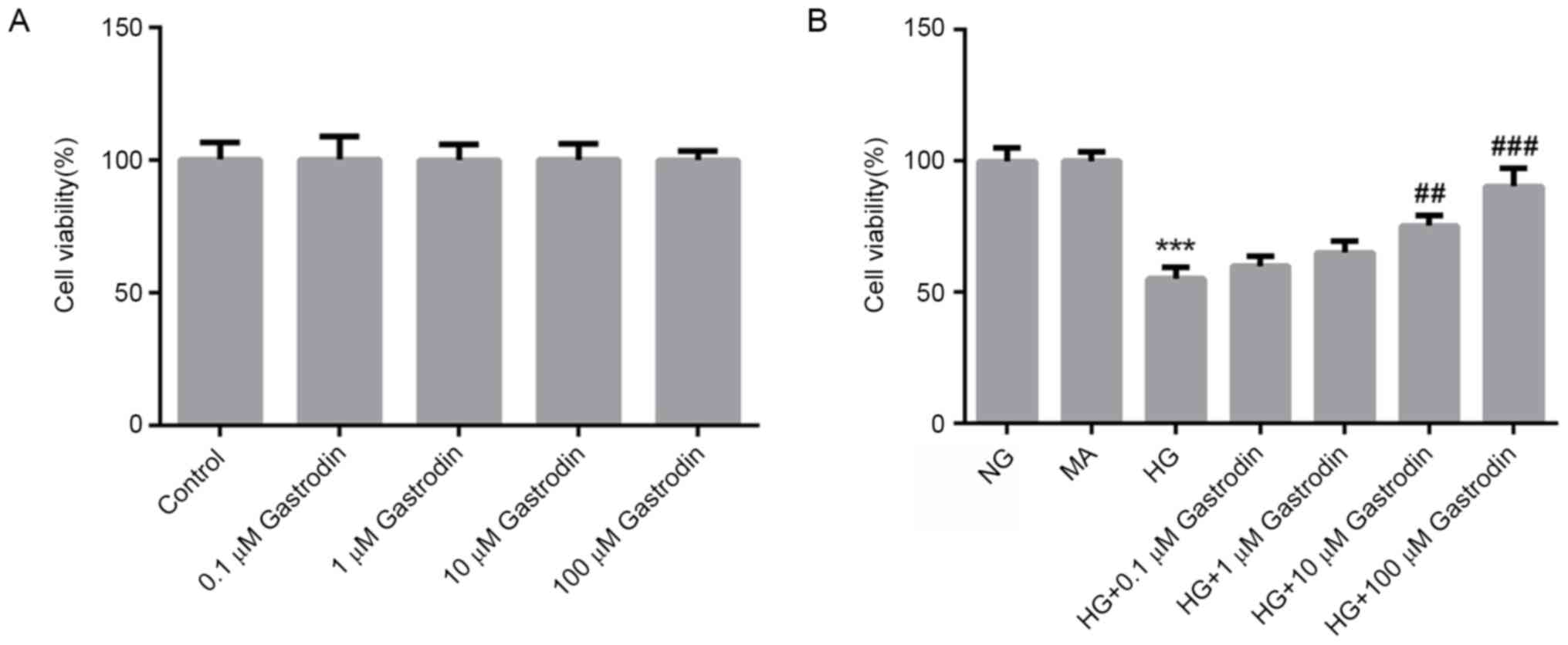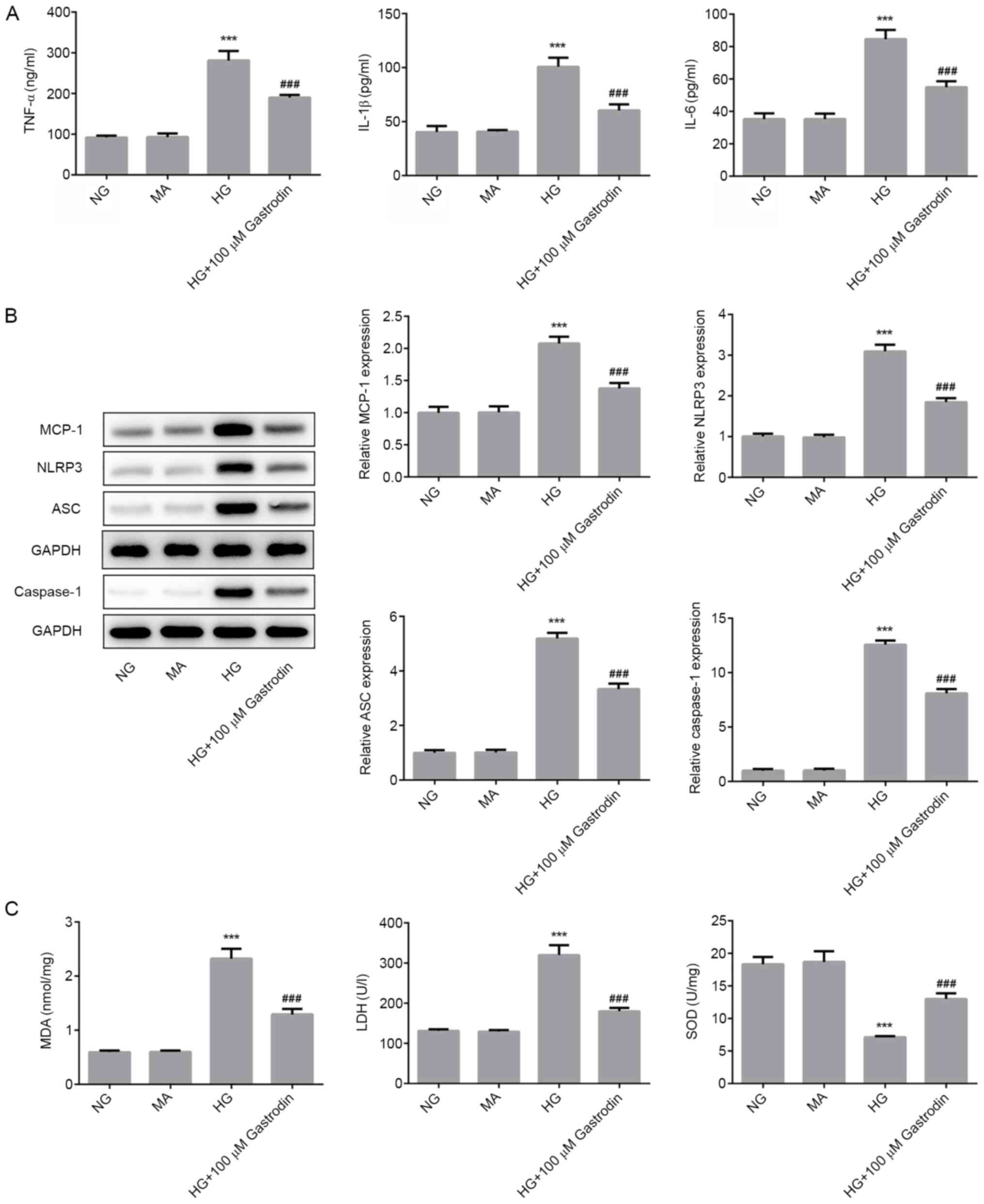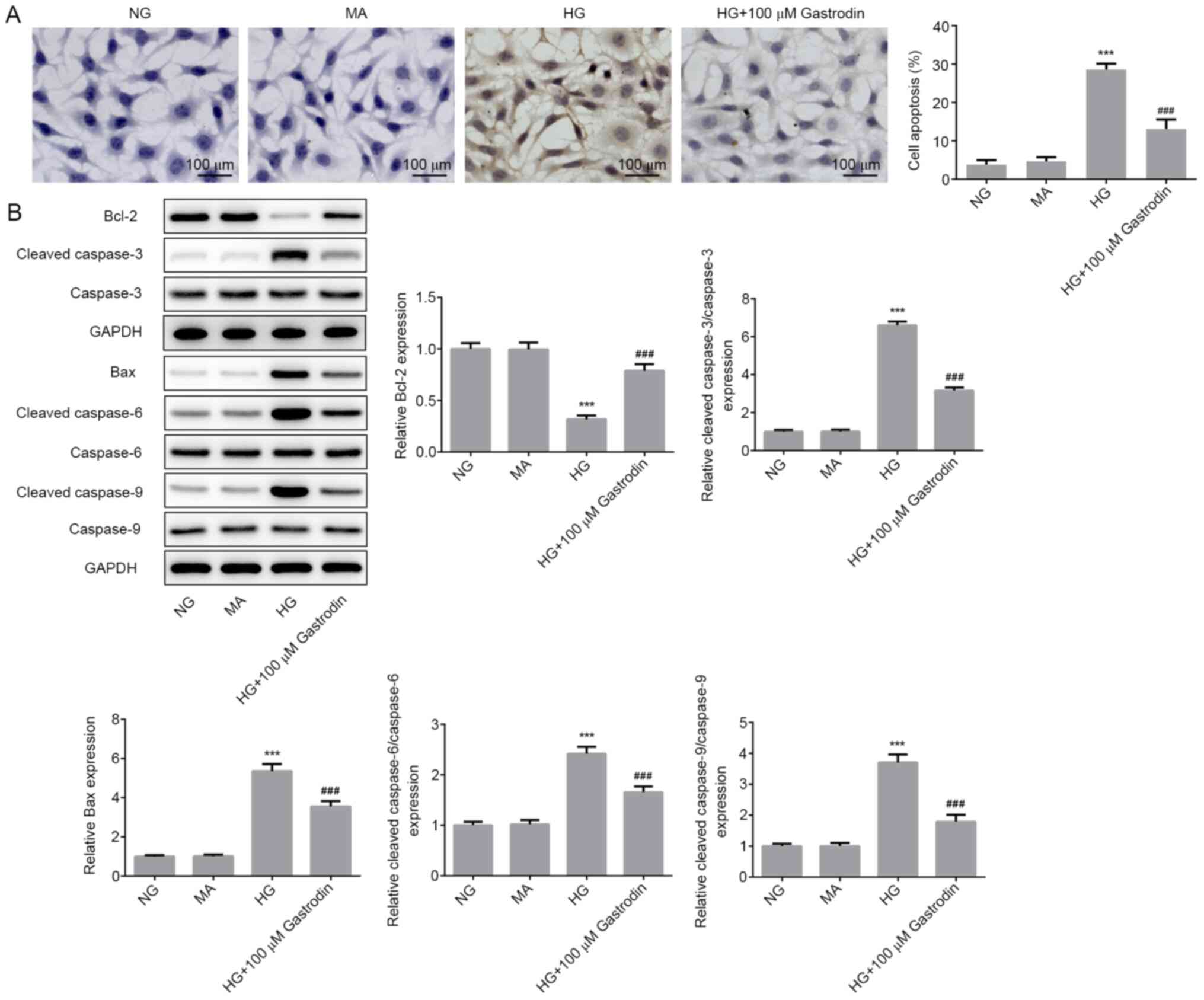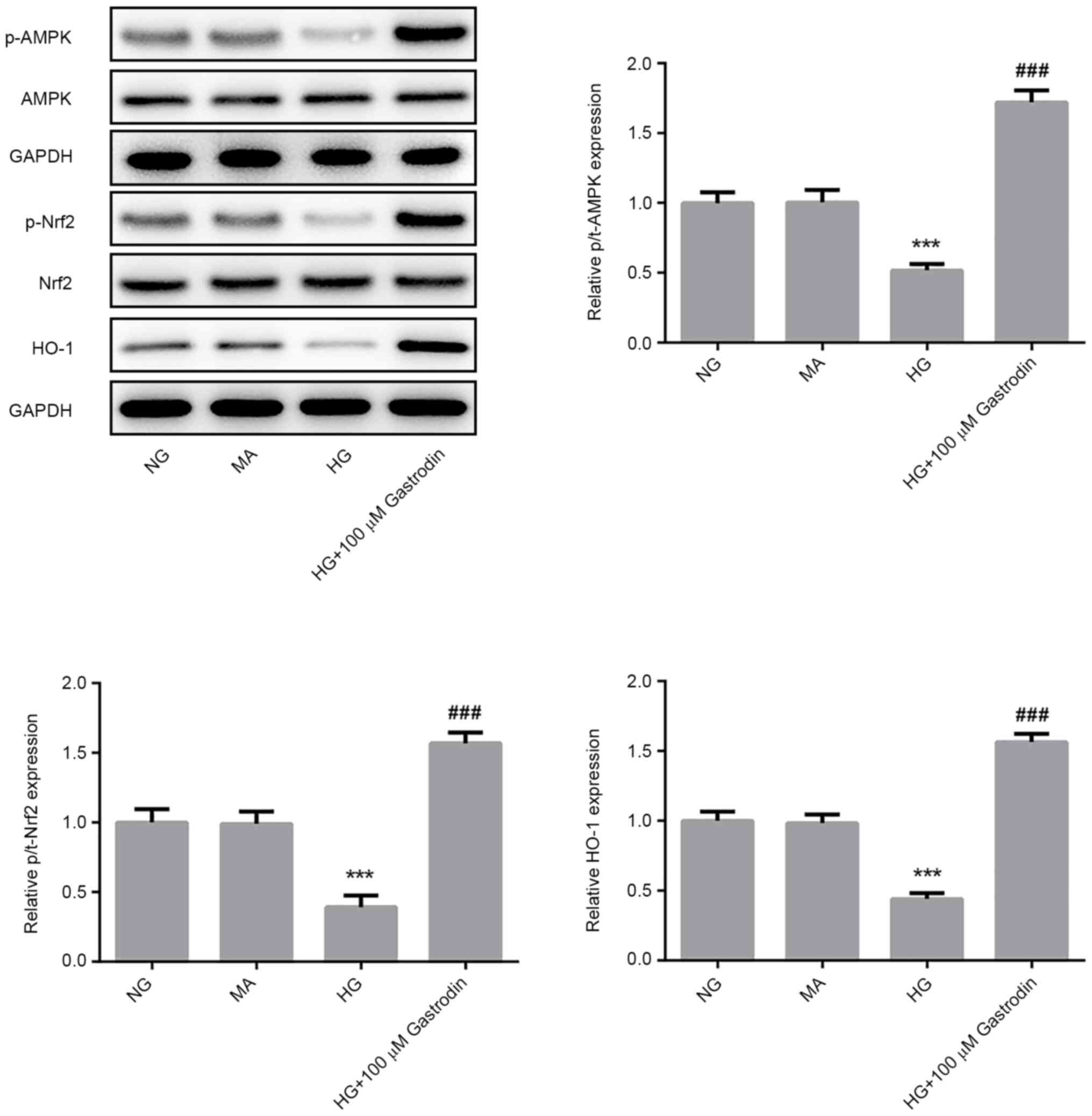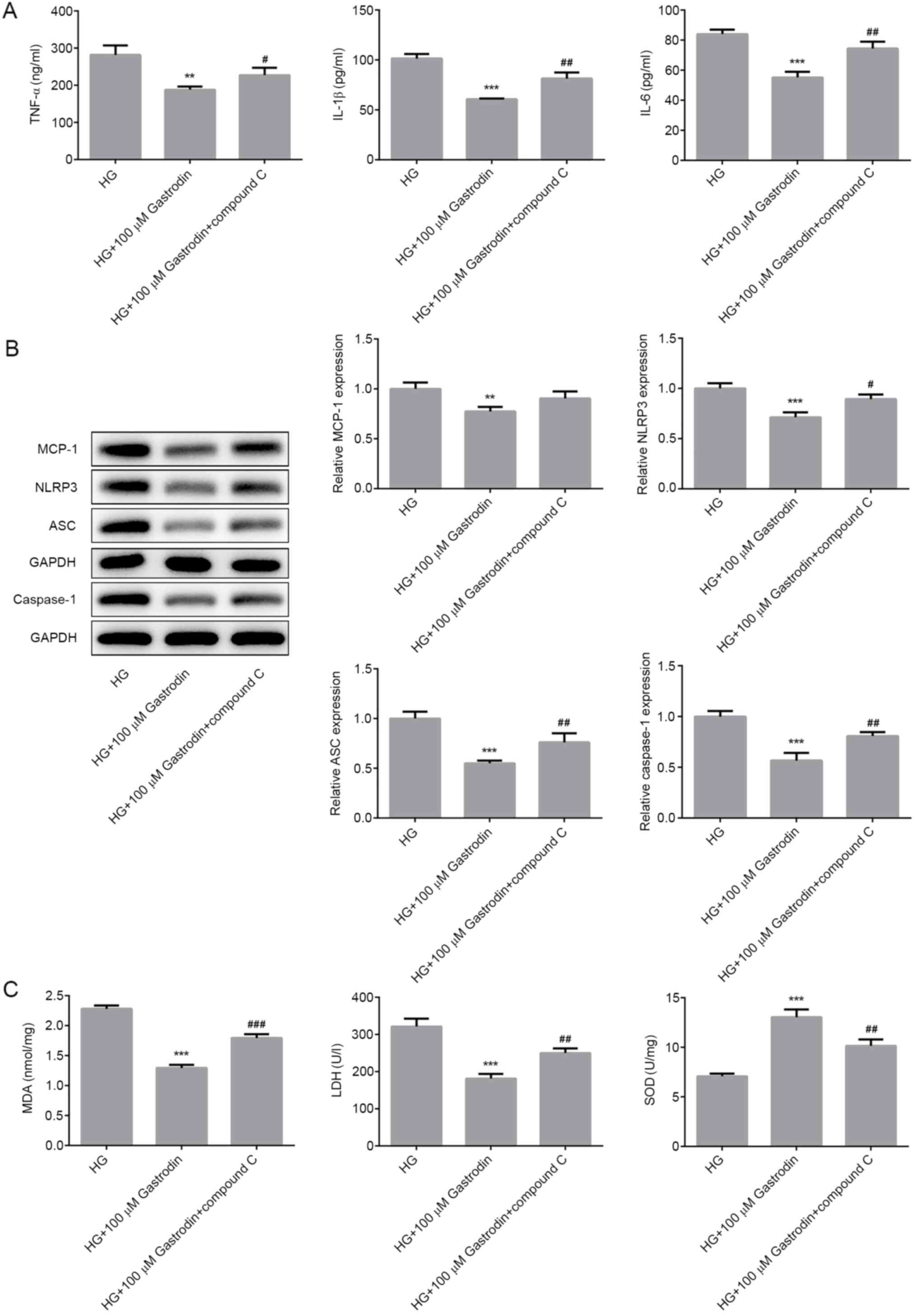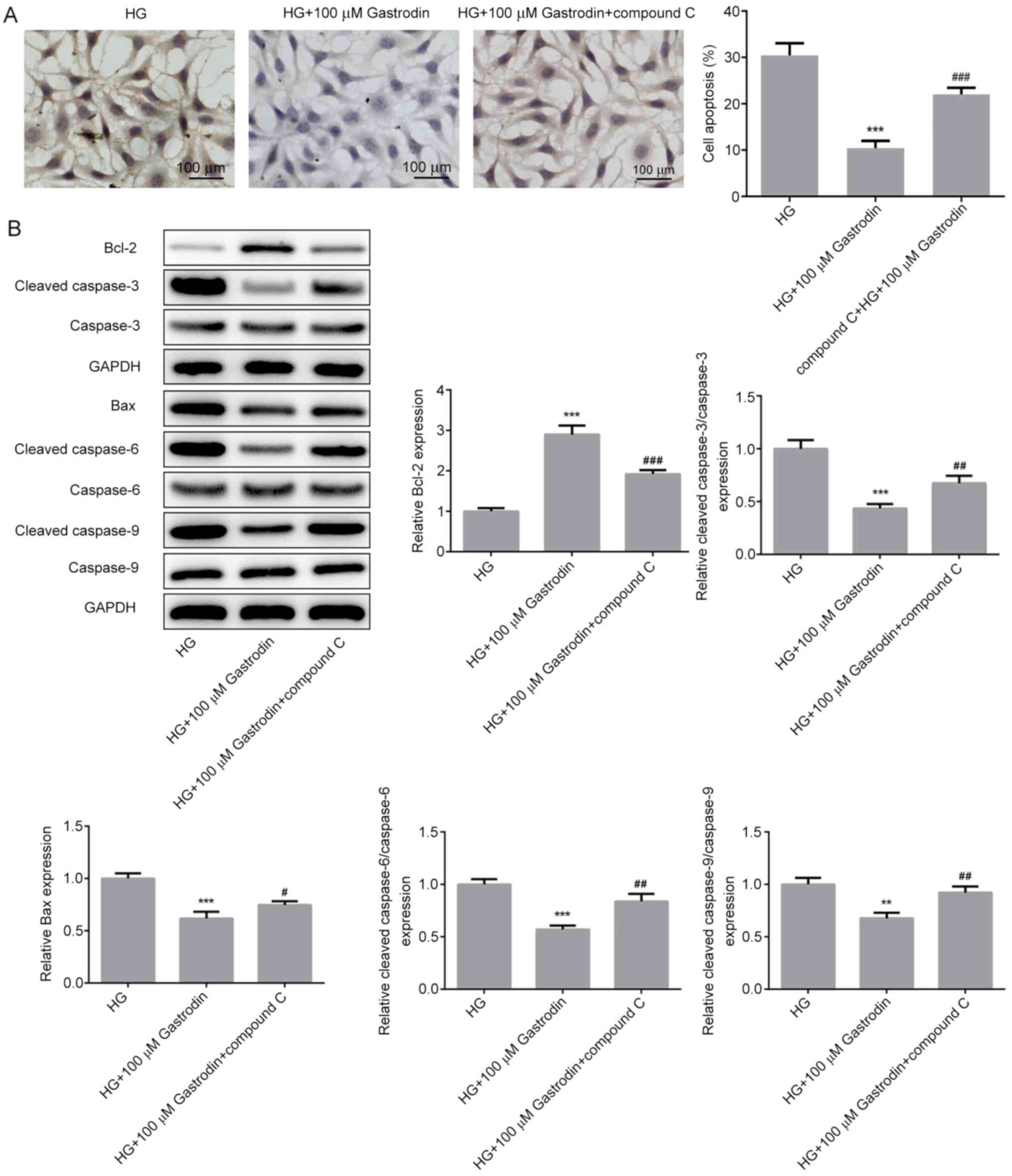|
1
|
Gnudi L, Coward RJM and Long DA: Diabetic
nephropathy: Perspective on novel molecular mechanisms. Trends
Endocrinol Metab. 27:820–830. 2016.PubMed/NCBI View Article : Google Scholar
|
|
2
|
Yamahara K, Yasuda M, Kume S, Koya D,
Maegawa H and Uzu T: The role of autophagy in the pathogenesis of
diabetic nephropathy. J Diabetes Res. 2013(193757)2013.PubMed/NCBI View Article : Google Scholar
|
|
3
|
Gheith O, Farouk N, Nampoory N, Halim MA
and Al-Otaibi T: Diabetic kidney disease: World wide difference of
prevalence and risk factors. J Nephropharmacol. 5:49–56.
2016.PubMed/NCBI
|
|
4
|
Feng Y, Weng H, Ling L, Zeng T, Zhang Y,
Chen D and Li H: Modulating the gut microbiota and inflammation is
involved in the effect of Bupleurum polysaccharides against
diabetic nephropathy in mice. Int J Biol Macromol. 132:1001–1011.
2019.PubMed/NCBI View Article : Google Scholar
|
|
5
|
Morigi M, Perico L, Corna D, Locatelli M,
Cassis P, Carminati CE, Bolognini S, Zoja C, Remuzzi G, Benigni A
and Buelli S: C3a receptor blockade protects podocytes from injury
in diabetic nephropathy. JCI Insight. 5(e131849)2020.PubMed/NCBI View Article : Google Scholar
|
|
6
|
Zhang P, Fang J, Zhang J, Ding S and Gan
D: Curcumin inhibited podocyte cell apoptosis and accelerated cell
autophagy in diabetic nephropathy via regulating
Beclin1/UVRAG/Bcl2. Diabetes Metab Syndr Obes. 13:641–652.
2020.PubMed/NCBI View Article : Google Scholar
|
|
7
|
Kim YI, Kim CH, Choi CS, Chung YE, Lee MS,
Lee SI, Park JY, Hong SK and Lee KU: Microalbuminuria is associated
with the insulin resistance syndrome independent of hypertension
and type 2 diabetes in the Korean population. Diabetes Res Clin
Pract. 52:145–152. 2001.PubMed/NCBI View Article : Google Scholar
|
|
8
|
Al-Rubeaan K, Siddiqui K, Alghonaim M,
Youssef AM and AlNaqeb D: The Saudi diabetic kidney disease study
(Saudi-DKD): Clinical characteristics and biochemical parameters.
Ann Saudi Med. 38:46–56. 2018.PubMed/NCBI View Article : Google Scholar
|
|
9
|
Lopes TG, de Souza ML, da Silva VD, Dos
Santos M, da Silva WIC, Itaquy TP, Garbin HI and Veronese FV:
Markers of renal fibrosis: How do they correlate with podocyte
damage in glomerular diseases? PLoS One.
14(e0217585)2019.PubMed/NCBI View Article : Google Scholar
|
|
10
|
Chen Y, Lin L, Tao X, Song Y, Cui J and
Wan J: The role of podocyte damage in the etiology of
ischemia-reperfusion acute kidney injury and post-injury fibrosis.
BMC Nephrol. 20(106)2019.PubMed/NCBI View Article : Google Scholar
|
|
11
|
Ilatovskaya DV, Blass G, Palygin O,
Levchenko V, Pavlov TS, Grzybowski MN, Winsor K, Shuyskiy LS,
Geurts AM, Cowley AW Jr, et al: A NOX4/TRPC6 pathway in podocyte
calcium regulation and renal damage in diabetic kidney disease. J
Am Soc Nephrol. 29:1917–1927. 2018.PubMed/NCBI View Article : Google Scholar
|
|
12
|
Khalilpourfarshbafi M, Hajiaghaalipour F,
Selvarajan KK and Adam A: Mesenchymal stem cell-based therapies
against podocyte damage in diabetic nephropathy. Tissue Eng Regen
Med. 14:201–210. 2017.PubMed/NCBI View Article : Google Scholar
|
|
13
|
Chen Y, Liu Q, Shan Z, Zhao Y, Li M, Wang
B, Zheng X and Feng W: The protective effect and mechanism of
catalpol on high glucose-induced podocyte injury. BMC Complement
Altern Med. 19(244)2019.PubMed/NCBI View Article : Google Scholar
|
|
14
|
Zhan X, Yan C, Chen Y, Wei X, Xiao J, Deng
L, Yang Y, Qiu P and Chen Q: Celastrol antagonizes high
glucose-evoked podocyte injury, inflammation and insulin resistance
by restoring the HO-1-mediated autophagy pathway. Mol Immunol.
104:61–68. 2018.PubMed/NCBI View Article : Google Scholar
|
|
15
|
Yu Q, Zhang M, Qian L, Wen D and Wu G:
Luteolin attenuates high glucose-induced podocyte injury via
suppressing NLRP3 inflammasome pathway. Life Sci. 225:1–7.
2019.PubMed/NCBI View Article : Google Scholar
|
|
16
|
Zhong Y, Lee K, Deng Y, Ma Y, Chen Y, Li
X, Wei C, Yang S, Wang T, Wong NJ, et al: Arctigenin attenuates
diabetic kidney disease through the activation of PP2A in
podocytes. Nat Commun. 10(4523)2019.PubMed/NCBI View Article : Google Scholar
|
|
17
|
Xu CB, Guo QL, Wang YN, Lin S, Zhu CG and
Shi JG: Gastrodin derivatives from gastrodia elata. Nat Prod
Bioprospect. 9:393–404. 2019.PubMed/NCBI View Article : Google Scholar
|
|
18
|
Liu Y, Gao J, Peng M, Meng H, Ma H, Cai P,
Xu Y, Zhao Q and Si G: A review on central nervous system effects
of gastrodin. Front Pharmacol. 9(24)2018.PubMed/NCBI View Article : Google Scholar
|
|
19
|
Ye T, Meng X, Zhai Y, Xie W, Wang R, Sun G
and Sun X: Gastrodin ameliorates cognitive dysfunction in diabetes
rat model via the suppression of endoplasmic reticulum stress and
NLRP3 inflammasome activation. Front Pharmacol.
9(1346)2018.PubMed/NCBI View Article : Google Scholar
|
|
20
|
Zhang TH, Huang CM, Gao X, Wang JW, Hao LL
and Ji Q: Gastrodin inhibits high glucose-induced human retinal
endothelial cell apoptosis by regulating the SIRT1/TLR4/NF-κBp65
signaling pathway. Mol Med Rep. 17:7774–7780. 2018.PubMed/NCBI View Article : Google Scholar
|
|
21
|
Cheng Y, Qi Y, Liu S, Di R, Shi Q, Li J
and Pei C: C1q/TNF-related protein 9 inhibits high glucose-induced
oxidative stress and apoptosis in retinal pigment epithelial cells
through the activation of AMPK/Nrf2 signaling pathway. Cell
Transplant. 29(963689720962052)2020.PubMed/NCBI View Article : Google Scholar
|
|
22
|
Xu W, Zhao T and Xiao H: The implication
of oxidative stress and AMPK-Nrf2 antioxidative signaling in
pneumonia pathogenesis. Front Endocrinol (Lausanne).
11(400)2020.PubMed/NCBI View Article : Google Scholar
|
|
23
|
Zhou F, Wang M, Ju J, Wang Y, Liu Z, Zhao
X, Yan Y, Yan S, Luo X and Fang Y: Schizandrin A protects against
cerebral ischemia-reperfusion injury by suppressing inflammation
and oxidative stress and regulating the AMPK/Nrf2 pathway
regulation. Am J Transl Res. 11:199–209. 2019.PubMed/NCBI
|
|
24
|
Qu LL, Yu B, Li Z, Jiang WX, Jiang JD and
Kong WJ: Gastrodin ameliorates oxidative stress and proinflammatory
response in nonalcoholic fatty liver disease through the AMPK/Nrf2
pathway. Phytother Res. 30:402–411. 2016.PubMed/NCBI View
Article : Google Scholar
|
|
25
|
Ma T, Zheng Z, Guo H, Lian X, Rane MJ, Cai
L, Kim KS, Kim KT, Zhang Z and Bi L: 4-O-methylhonokiol ameliorates
type 2 diabetes-induced nephropathy in mice likely by activation of
AMPK-mediated fatty acid oxidation and Nrf2-mediated anti-oxidative
stress. Toxicol Appl Pharmacol. 370:93–105. 2019.PubMed/NCBI View Article : Google Scholar
|
|
26
|
Wang RM, Wang ZB, Wang Y, Liu WY, Li Y,
Tong LC, Zhang S, Su DF, Cao YB, Li L and Zhang LC: Swiprosin-1
promotes mitochondria-dependent apoptosis of glomerular podocytes
via P38 MAPK pathway in early-stage diabetic nephropathy. Cell
Physiol Biochem. 45:899–916. 2018.PubMed/NCBI View Article : Google Scholar
|
|
27
|
Han X, Li Q, Wang C and Li Y:
MicroRNA-204-3p attenuates high glucose-induced MPC5 podocytes
apoptosis by targeting braykinin B2 receptor. Exp Clin Endocrinol
Diabetes. 127:387–395. 2019.PubMed/NCBI View Article : Google Scholar
|
|
28
|
Tu Q, Li Y, Jin J, Jiang X, Ren Y and He
Q: Curcumin alleviates diabetic nephropathy via inhibiting podocyte
mesenchymal transdifferentiation and inducing autophagy in rats and
MPC5 cells. Pharm Biol. 57:778–786. 2019.PubMed/NCBI View Article : Google Scholar
|
|
29
|
Cao Y, Hao Y, Li H, Liu Q, Gao F, Liu W
and Duan H: Role of endoplasmic reticulum stress in apoptosis of
differentiated mouse podocytes induced by high glucose. Int J Mol
Med. 33:809–816. 2014.PubMed/NCBI View Article : Google Scholar
|
|
30
|
Xi Z, Qiao Y, Wang J, Su H, Bao Z, Li H,
Liao X and Zhong X: Gastrodin relieves inflammation injury induced
by lipopolysaccharides in MRC-5 cells by up-regulation of miR-103.
J Cell Mol Med. 24:1451–1459. 2020.PubMed/NCBI View Article : Google Scholar
|
|
31
|
Kim SH, Hwang JT, Park HS, Kwon DY and Kim
MS: Capsaicin stimulates glucose uptake in C2C12 muscle cells via
the reactive oxygen species (ROS)/AMPK/p38 MAPK pathway. Biochem
Biophys Res Commun. 439:66–70. 2013.PubMed/NCBI View Article : Google Scholar
|
|
32
|
Chuang KC, Chen FW, Tsai MH and Shieh JJ:
EGR-1 plays a protective role in AMPK inhibitor compound C-induced
apoptosis through ROS-induced ERK activation in skin cancer cells.
Oncol Lett. 21(304)2021.PubMed/NCBI View Article : Google Scholar
|
|
33
|
Bhattacharjee N, Barma S, Konwar N,
Dewanjee S and Manna P: Mechanistic insight of diabetic nephropathy
and its pharmacotherapeutic targets: An update. Eur J Pharmacol.
791:8–24. 2016.PubMed/NCBI View Article : Google Scholar
|
|
34
|
Papadopoulou-Marketou N, Chrousos GP and
Kanaka-Gantenbein C: Diabetic nephropathy in type 1 diabetes: A
review of early natural history, pathogenesis, and diagnosis.
Diabetes Metab Res Rev. 33(e2841)2017.PubMed/NCBI View Article : Google Scholar
|
|
35
|
Zhang XX, Kong J and Yun K: Prevalence of
diabetic nephropathy among patients with type 2 diabetes mellitus
in China: A meta-analysis of observational studies. J Diabetes Res.
2020(2315607)2020.PubMed/NCBI View Article : Google Scholar
|
|
36
|
Xiong Y and Zhou L: The signaling of
cellular senescence in diabetic nephropathy. Oxid Med Cell Longev.
2019(7495629)2019.PubMed/NCBI View Article : Google Scholar
|
|
37
|
Bose M, Almas S and Prabhakar S: Wnt
signaling and podocyte dysfunction in diabetic nephropathy. J
Investig Med. 65:1093–1101. 2017.PubMed/NCBI View Article : Google Scholar
|
|
38
|
Tung CW, Hsu YC, Shih YH, Chang PJ and Lin
CL: Glomerular mesangial cell and podocyte injuries in diabetic
nephropathy. Nephrology (Carlton). 23 (Suppl 4):S32–S37.
2018.PubMed/NCBI View Article : Google Scholar
|
|
39
|
Wang S, Zhao X, Yang S, Chen B and Shi J:
Salidroside alleviates high glucose-induced oxidative stress and
extracellular matrix accumulation in rat glomerular mesangial cells
by the TXNIP-NLRP3 inflammasome pathway. Chem Biol Interact.
278:48–53. 2017.PubMed/NCBI View Article : Google Scholar
|
|
40
|
Zhao MX, Zhou B, Ling L, Xiong XQ, Zhang
F, Chen Q, Li YH, Kang YM and Zhu GQ: Salusin-β contributes to
oxidative stress and inflammation in diabetic cardiomyopathy. Cell
Death Dis. 8(e2690)2017.PubMed/NCBI View Article : Google Scholar
|
|
41
|
Sutterwala FS, Ogura Y, Szczepanik M,
Lara-Tejero M, Lichtenberger GS, Grant EP, Bertin J, Coyle AJ,
Galán JE, Askenase PW and Flavell RA: Critical role for
NALP3/CIAS1/Cryopyrin in innate and adaptive immunity through its
regulation of caspase-1. Immunity. 24:317–327. 2006.PubMed/NCBI View Article : Google Scholar
|
|
42
|
Pétrilli V, Dostert C, Muruve DA and
Tschopp J: The inflammasome: A danger sensing complex triggering
innate immunity. Curr Opin Immunol. 19:615–622. 2007.PubMed/NCBI View Article : Google Scholar
|
|
43
|
Lin TA, Wu VC and Wang CY: Autophagy in
chronic kidney diseases. Cells. 8(61)2019.PubMed/NCBI View Article : Google Scholar
|
|
44
|
Kosuru R, Kandula V, Rai U, Prakash S, Xia
Z and Singh S: Pterostilbene decreases cardiac oxidative stress and
inflammation via activation of AMPK/Nrf2/HO-1 pathway in
fructose-fed diabetic rats. Cardiovasc Drugs Ther. 32:147–163.
2018.PubMed/NCBI View Article : Google Scholar
|
|
45
|
Tanaka M, Kishimoto Y, Sasaki M, Sato A,
Kamiya T, Kondo K and Iida K: Terminalia bellirica (Gaertn.) Roxb.
extract and gallic acid attenuate LPS-induced inflammation and
oxidative stress via MAPK/NF-κB and Akt/AMPK/Nrf2 pathways. Oxid
Med Cell Longev. 2018(9364364)2018.PubMed/NCBI View Article : Google Scholar
|
|
46
|
Wang Y, Huang Y, Xu Y, Ruan W, Wang H,
Zhang Y, Saavedra JM, Zhang L, Huang Z and Pang T: A Dual AMPK/Nrf2
activator reduces brain inflammation after stroke by enhancing
microglia M2 polarization. Antioxid Redox Signal. 28:141–163.
2018.PubMed/NCBI View Article : Google Scholar
|
|
47
|
Zeng HL, Huang SL, Xie FC, Zeng LM, Hu YH
and Leng Y: Yhhu981, a novel compound, stimulates fatty acid
oxidation via the activation of AMPK and ameliorates lipid
metabolism disorder in ob/ob mice. Acta Pharmacol Sin. 36:343–352.
2015.PubMed/NCBI View Article : Google Scholar
|
|
48
|
Zhan X, Li J and Zhou T: Targeting
Nrf2-mediated oxidative stress response signaling pathways as new
therapeutic strategy for pituitary adenomas. Front Pharmacol.
12(565748)2021.PubMed/NCBI View Article : Google Scholar
|
|
49
|
Kim Y, Lee H, Kim SY and Lim Y: Effects of
lespedeza bicolor extract on regulation of AMPK associated hepatic
lipid metabolism in type 2 diabetic mice. Antioxidants (Basel).
8(599)2019.PubMed/NCBI View Article : Google Scholar
|
|
50
|
Huang Q, Wang T, Yang L and Wang HY:
Ginsenoside Rb2 alleviates hepatic lipid accumulation by restoring
autophagy via induction of Sirt1 and activation of AMPK. Int J Mol
Sci. 18(1063)2017.PubMed/NCBI View Article : Google Scholar
|















